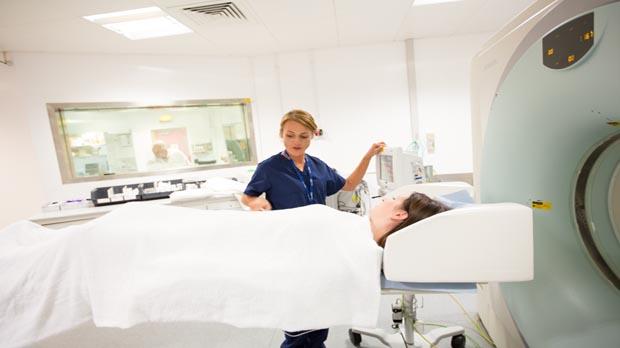
Last year in the UK over 60,000 cancer patients enrolled on clinical trials aimed at improving cancer treatments and making them available to all.
Please note - this trial is no longer recruiting patients. We hope to add results when they are available.
We know that a lot of women have symptoms such as bloating and tummy discomfort. It is also very common to have swellings (cysts) on women’s ovaries picked up on an ultrasound scan. But only a very small number of these women will go on to be diagnosed with ovarian cancer.
Current guidelines for GP’s are to test women who have symptoms of tummy pain or bloating with a blood test called CA125, followed by an ultrasound scan if the blood test result is raised. But there are a number of other conditions that can cause a CA125 blood test to be raised. And CA125 is only raised in half the number of women who have early ovarian cancer. This means that many women referred have a low risk of cancer and others aren’t referred until their cancer is more advanced. Also, in younger women, it is common to have ovarian cysts that aren’t cancerous
The researchers in this trial think that collecting information about current tests could help to identify better tests in the future and this may help to improve diagnosis.
The aims of the study are to
Joining this study will not change your treatment, and you may not get any direct benefit from taking part. The researchers hope that the information they collect will help to improve diagnosis for women with ovarian cancer in the future.
Please note, from the end of November 2018, you can't join the study if you are postmenopausal. You may now only join if you are premenopausal.
You may be able to join the main study if all of the following apply. You
As well as the above, you
 )
)You cannot join this study if any of these apply. You
The researchers need 2,748 women to take part. Some will have been through the menopause (postmenopausal) and some won’t (premenopausal).
Everyone taking part
Specially trained radiographers will look at these scans in detail. You would most likely have these scans as part of your usual care. Some women might need to have an extra scan but the study team can tell you more if this applies to you.
ROCkeTS-GEN sub study
This is a sub-study for women who have been through menopause. It is for people who are 51 to 90 years old. There are other entry conditions and the team can tell you more about this.
In this part of the study you give a blood sample. The team plan to use the sample to look for small pieces of DNA from cancer cells ( ).
).
It is unlikely you will need any extra hospital visits as a result of taking part in this study, but this will depend on your local service.
If you don’t have surgery as part of your usual care, a research nurse will contact you at a routine hospital visit or at home a year after you joined the study to see how you are getting on. If you do have surgery as part of your usual care, the researchers will ask to link your details to national registries that store health information. This will help the researchers check if the blood tests we do now can predict any medical problems in the future.
The researchers don’t expect there to be any side effects as a result of taking part in this study.
Please note: In order to join a trial you will need to discuss it with your doctor, unless otherwise specified.
Professor Sudha Sundar
NIHR Clinical Research Network: Cancer
NIHR Health Technology Assessment (HTA) programme
University of Birmingham
If you have questions about the trial please contact our cancer information nurses
Freephone 0808 800 4040

Last year in the UK over 60,000 cancer patients enrolled on clinical trials aimed at improving cancer treatments and making them available to all.